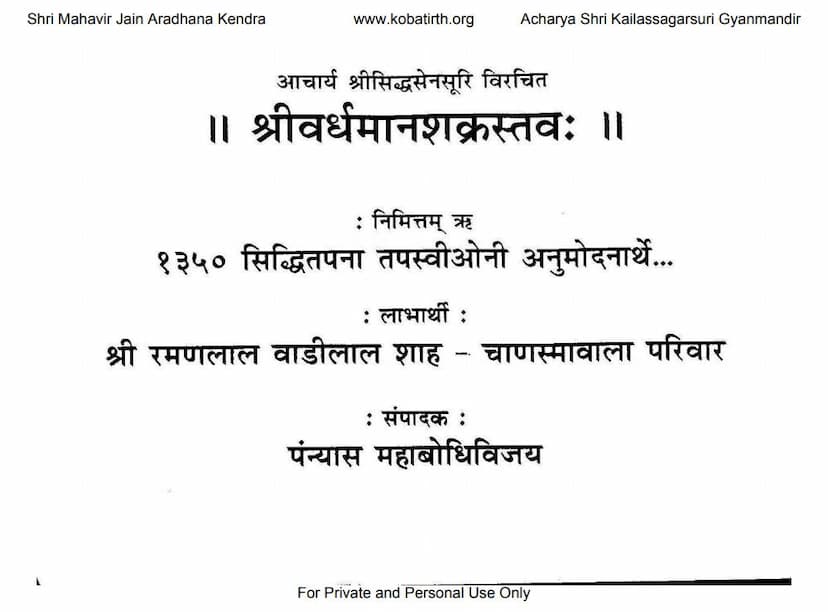Vardhaman Shakra Stav
Added to library: September 2, 2025

Summary
Here is a comprehensive summary of the Jain text "Vardhaman Shakra Stav" by Siddhasensuri, edited by Mahabodhivijay:
Book Title: Vardhaman Shakra Stav (Praise of Vardhamana as Indra) Author: Siddhasensuri Editor: Mahabodhivijay Publisher: Ramanlal Vadilal Shah Context: This text is dedicated to the approval and remembrance of ascetics who observed the penance of 1350.
Core Content and Theme:
The "Vardhaman Shakra Stav" is a devotional hymn that extols the virtues and divine qualities of Lord Mahavir, the 24th Tirthankara of Jainism. The title itself, "Shakra Stav" (Praise of Indra), implies that Lord Mahavir is being praised with the attributes and majesty associated with Indra, the king of gods, thus elevating Mahavir to an even higher, supreme status. The text systematically lists numerous epithets and descriptions of Lord Mahavir, highlighting his spiritual perfections, his role as a spiritual guide, and his ultimate liberation.
Key Sections and Themes:
The Stav is structured as a series of salutations ("Om Namo Arhate") followed by a list of laudatory attributes. While the numbering and precise breakdown vary slightly across the pages, the overarching themes revolve around:
- Supreme Divinity and Purity: Lord Mahavir is described as the supreme soul, the ultimate light, the highest being, and pure essence. He is beyond darkness, having the color of the sun, and has completely eradicated all afflictions originating from the beginning.
- Spiritual Authority and Guidance: He is the lord of the triple world, the source of all human endeavors, the promulgator of faultless knowledge, and the one who guides beings across the ocean of existence. He is the pathfinder, the giver of wisdom, and the one who bestows liberation.
- Transcendent Qualities: Mahavir is depicted as being beyond the gunas (Sattva, Rajas, Tamas), possessing infinite virtues, and being beyond the scope of speech and mind. He is the cause of causes, the revealer of truth, and the embodiment of absolute detachment.
- Conqueror of Ignorance and Afflictions: He has destroyed the eight karmas, is the master of all, and is the source of the world's illumination. He has overcome the cycle of birth and death and is free from all impurities.
- Omniscience and Omnipresence: He is the knower of past, present, and future, the all-knowing, and the all-seeing. His knowledge is all-encompassing, and he is the essence of all scriptures and spiritual wisdom.
- Embodiment of Jain Principles: He is the one who has achieved and preached the principles of Jainism, including the doctrine of Syadvada (relativism). He is the liberator of all beings from false doctrines.
- Attributes of a Supreme Being: The text attributes qualities typically associated with supreme deities in various traditions, such as being the creator, sustainer, and destroyer, though within the Jain framework, these are understood as powers attained through spiritual exertion and liberation, not as active roles in a cosmic creation myth. He is the father, mother, guide, teacher, and ultimate refuge.
- The Goal of Liberation (Moksha): The Stav culminates in describing Mahavir as one who has attained the state of ultimate liberation, characterized by immense bliss, freedom from suffering, immortality, and eternal peace.
Significance and Benefits of Recitation:
The latter part of the text (pages 14-20) elaborates on the profound benefits of reciting, chanting, contemplating, and listening to this "Shakra Stav." These benefits are extensive and encompass:
- Attainment of Siddhis (Powers): It is described as a bestower of eight great powers.
- Removal of Sins and Afflictions: It purifies from all sins, removes all faults, and is a source of all virtues.
- Divine Favor and Support: It pleases celestial beings (Bhawanapati, Vyantar, Jyotishka, Vaimanika deities), and leads to their favorable disposition.
- Positive Influence on Elements: It makes the earthly elements (earth, water, fire, air, space) favorable.
- Prosperity and Well-being: It is the root of all prosperity, leading to auspicious fortunes, virtuous progeny, supportive friends, wealth, health, longevity, reputation, and overall success in worldly life.
- Spiritual Advancement: It fosters devotion to Jinism, attracts the grace of spiritual beings, and leads to the suppression of enemies and negative influences.
- Harmony with Nature: Even dangerous creatures become friendly.
- Transformation of the Ordinary: Inferior things transform into superior ones.
- Fulfillment of Desires: It helps in attaining wealth, righteousness, and desirable qualities.
- Ultimate Liberation: It bestows celestial glory, heavenly pleasures, and ultimately, the state of Moksha (liberation).
Concluding Remarks:
The "Vardhaman Shakra Stav" is a powerful devotional piece that aims to instill deep reverence for Lord Mahavir and to guide practitioners towards spiritual elevation and ultimate liberation through the constant remembrance and recitation of his divine attributes. It emphasizes that through the grace of the praised, all accomplishments and spiritual goals can be achieved. The concluding verses reiterate the profound connection between the devotee and Lord Mahavir, viewing Him as the sole refuge and the embodiment of all that is sacred and desirable.